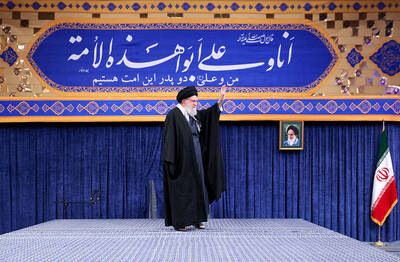Snipers killed one policeman and wounded two in Indonesia's strife-torn Ambon yesterday, aiming at police and soldiers patrolling the streets to restore order, officials and witnesses said.
Although the death toll from the violence between Christian and Muslim residents rose to some 25, there were signs the fighting that flared over the weekend was dying down.
Nevertheless, the UN said 44 Indonesian staff and their families were leaving the eastern city yesterday. A UN office was among a number of buildings burnt when the violence erupted on Sunday.
Three policemen from the Jakarta mobile brigade were shot in one of the neighborhoods that has seen the worst violence, said Hamid Kasim, an editor of a local newspaper.
Kasim said locals shouted slogans blaming Christians when a wounded policeman was carried into the city's main mosque.
"People became agitated," he said.
A police spokesman said one policeman was killed, disputing earlier witness accounts that two had died.
The Indonesian government has sent 400 police and two army battalions to restore peace in the provincial capital of the eastern Moluccas archipelago. The violence has wounded about 150 people, officials say.
Analysts said complacency was partly to blame for the unrest, which stemmed from an event that has long created tension in a region still traumatized by three years of widespread sectarian fighting that killed 5,000 people before a peace deal was signed in early 2002.
The latest clashes began after police arrested people trying to raise the banned flag of a little known and mostly Christian rebel group, the South Moluccas Republic Movement (RMS), on the anniversary of a failed independence bid 54 years ago.
"The current conflict came about because of police complacency and competition among security forces over territory, between individuals in the police and the army," said defense analyst Kusnanto Anggoro.
"Containment of this flare-up will depend on how that problem is resolved. I don't believe this is coincidental."
On Monday, violence was concentrated in two mixed neighborhoods where scores of houses and a university were set ablaze. The incident prompted shops to close and halted transport in several parts of the city.
Despite the sniper shooting, Ambon was largely free of the street battles and the arson of the past two days.
"There are no more torchings. The troop reinforcements have made the conflict drop drastically. The local government has spread them around sensitive places and people are seeing things get back to normal today," said city official Isaac Saimima. "Very few Christians support RMS."
Another official said she could still hear gunfire and explosions but far less than on Sunday, when the sounds of home-made bomb blasts and shouting mobs filled the air.
Many shops and government offices had reopened.
An official from the UN Development Program said UN staff could return when security improved. The UN has been involved in rebuilding efforts.

Shamans in Peru on Monday gathered for an annual New Year’s ritual where they made predictions for the year to come, including illness for US President Donald Trump and the downfall of Venezuelan President Nicolas Maduro. “The United States should prepare itself because Donald Trump will fall seriously ill,” Juan de Dios Garcia proclaimed as he gathered with other shamans on a beach in southern Lima, dressed in traditional Andean ponchos and headdresses, and sprinkling flowers on the sand. The shamans carried large posters of world leaders, over which they crossed swords and burned incense, some of which they stomped on. In this

Indonesia yesterday began enforcing its newly ratified penal code, replacing a Dutch-era criminal law that had governed the country for more than 80 years and marking a major shift in its legal landscape. Since proclaiming independence in 1945, the Southeast Asian country had continued to operate under a colonial framework widely criticized as outdated and misaligned with Indonesia’s social values. Efforts to revise the code stalled for decades as lawmakers debated how to balance human rights, religious norms and local traditions in the world’s most populous Muslim-majority nation. The 345-page Indonesian Penal Code, known as the KUHP, was passed in 2022. It

‘TRUMP’S LONG GAME’: Minnesota Governor Tim Walz said that while fraud was a serious issue, the US president was politicizing it to defund programs for Minnesotans US President Donald Trump’s administration on Tuesday said it was auditing immigration cases involving US citizens of Somalian origin to detect fraud that could lead to denaturalization, or revocation of citizenship, while also announcing a freeze of childcare funds to Minnesota and demanding an audit of some daycare centers. “Under US law, if an individual procures citizenship on a fraudulent basis, that is grounds for denaturalization,” US Department of Homeland Security Assistant Secretary Tricia McLaughlin said in a statement. Denaturalization cases are rare and can take years. About 11 cases were pursued per year between 1990 and 2017, the Immigrant Legal Resource

ANGER: US-based activists reported protests at 174 locations across the country, with at least 582 arrested and 15 killed, while Khamenei said the protesters were ‘paid’ Iran’s supreme leader on Saturday said that “rioters must be put in their place” after a week of protests that have shaken the Islamic Republic, likely giving security forces a green light to aggressively put down the demonstrations. The first comments by 86-year-old Ayatollah Ali Khamenei come as violence surrounding the demonstrations sparked by Iran’s ailing economy has killed at least 15 people, according to human rights activists. The protests show no sign of stopping and follow US President Donald Trump warning Iran on Friday that if Tehran “violently kills peaceful protesters,” the US “will come to their rescue.” While it remains